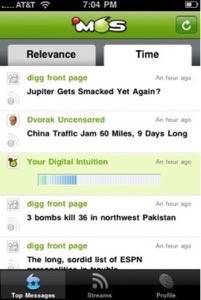Personalized news recommendations on the go – that’s the dream of many an online news nerd and the startups that would serve them. One strong entrant into this field is My6Sense, a well-designed, venture-backed, Israeli company that uses implicit behavioral data from users to recommend the most relevant content in your personal river of news.

It’s a good service, and one you’re likely to hear a lot more about soon. The company will announce this week that it has hired Louis Gray, a self-made Silicon Valley internet celebrity and startup consultant, as its VP of Marketing and first US employee.
The Good Stuff Machine
Using My6Sense is easy. We first reviewed it last Summer, but here’s how it works. Sync your Google Reader, Twitter, Facebook or other account, or add default recommended streams. Click through and read, share or delete the stories you do or don’t like. It’s a well designed feed reader. Then, the service will learn what you like and offer two views: most recent and most relevant news for you.

There are many apps that offer personalized mobile news reading experiences. Many people believe that mobile recommendation technologies are to the future what web search was to the previous iteration of the web.
My6Sense is the one most closely aligned with your existing streams of content. I have a very large list of subscriptions in Google Reader and the latest version of the app was able to pull those feeds down and let me read them very quickly. After one session of using the app, it started offering me a recommended stream. The user experience is suitable for both beginning and advanced news feed readers.
Will novice web users, everyday people, care about a service like this? That will be the challenge faced by the company’s new Marketing VP.
Hiring Louis Gray
My6Sense will announce this week that it has hired tech blogger Louis Gray as its first US employee. Gray is on the short list of the web’s best examples of bootstrapping-by-blog. He’s got an inspiring and accessible story.
Gray was the Online Editor for the UC Berkley student newspaper at the end of the 1990’s. Shortly after graduating, he took a job marketing a firm that describes itself as providing “unified network storage systems to enterprise markets.” After eight years of what sounds to me like a terribly boring position, Gray used his personal blog LouisGray.com to launch a new career.

In 2008, he started breaking news – often about tiny, experimental, new feed-reading services. He would find them in his traffic logs as referring URLs, reach out to the founders of the still-unlaunched startups and then write long, in-depth explanations of their features and strategies. It was a time when new startups were thought of as exciting and blog audiences cared about more than just Facebook, Twitter and Google.
TechCrunch and Robert Scoble began to link to his posts. He was beating them to stories, and writing well. He developed a following of like-minded feed-wonks on sites like FriendFeed and later, Google Buzz. He kept finding apps before anyone else, and writing about them in great detail.
Some of us wondered which leading tech news blog would hire Gray first, but we assumed that with eight years of experience as a marketer in enterprise software – he was out of the pay range of most upstart online news outfits.
Some times Gray takes on an air of undue self-importance, and sometimes he’s too verbose. But he’s a blogger, a person who built a career of his own choosing through hard work and the democratic power of free, easy, self-publishing technology. Such Old West style figures are never perfect, and they shouldn’t be.
It was also unclear, and it still is, whether Gray can reach audiences outside of tens of thousands of news-feed magicians and other people who enjoy discussing things like the role of online user attention data standards in tackling information overload. (Saying there are tens of thousands of those people in the world may be generous, too.)
Some times Gray takes on an air of undue self-importance, and sometimes he’s too verbose. But he’s a blogger, a person who built a career of his own choosing through hard work and the democratic power of free, easy, self-publishing technology. Such Old West style figures are never perfect, and they shouldn’t be.
In the Spring of 2009, Gray left his marketing job and co-founded a startup-advising consulting company. It made sense, these were the types of startups that got their first breaks being covered on his blog, and he offered good advice. Now, 18 months later, Gray says that company, Paladin Advisors, is still growing and hiring – but he’s decided to join My6Sense, one of the group’s clients, as an employee.
“It’s good to feel like I can have an impact on the things that are most interesting to me,” Gray told me today by phone.
“Often, bloggers feel like they have to sit on the sideline and comment. It can be easy to be an armchair quarterback, but it’s quite another to get your hands dirty. Social networking is important – it’s important that everyone has a voice and that you can share your voice in whatever medium is most appropriate for you. It’s important to me to be an active participant in this market.”
Louis Gray is a man with a family, who left a good job of many years to live the startup life. It’s something he’s able to do because he combined free online software with elbow grease. Now he’s going to become the only US employee of a small startup that ingests feed reader subscription lists and implicit mobile news-reading behavioral data to power personalized content recommendations. That’s really bleeding-edge stuff. He’s doing it, he says, to get some skin in the game in an industry that’s offering anyone in the world a voice, just like it did him.
That’s pretty awesome.
Photo: Gray in 2008, with his twins wearing Google and FriendFeed outfits. Photo by Robert Scoble.

















